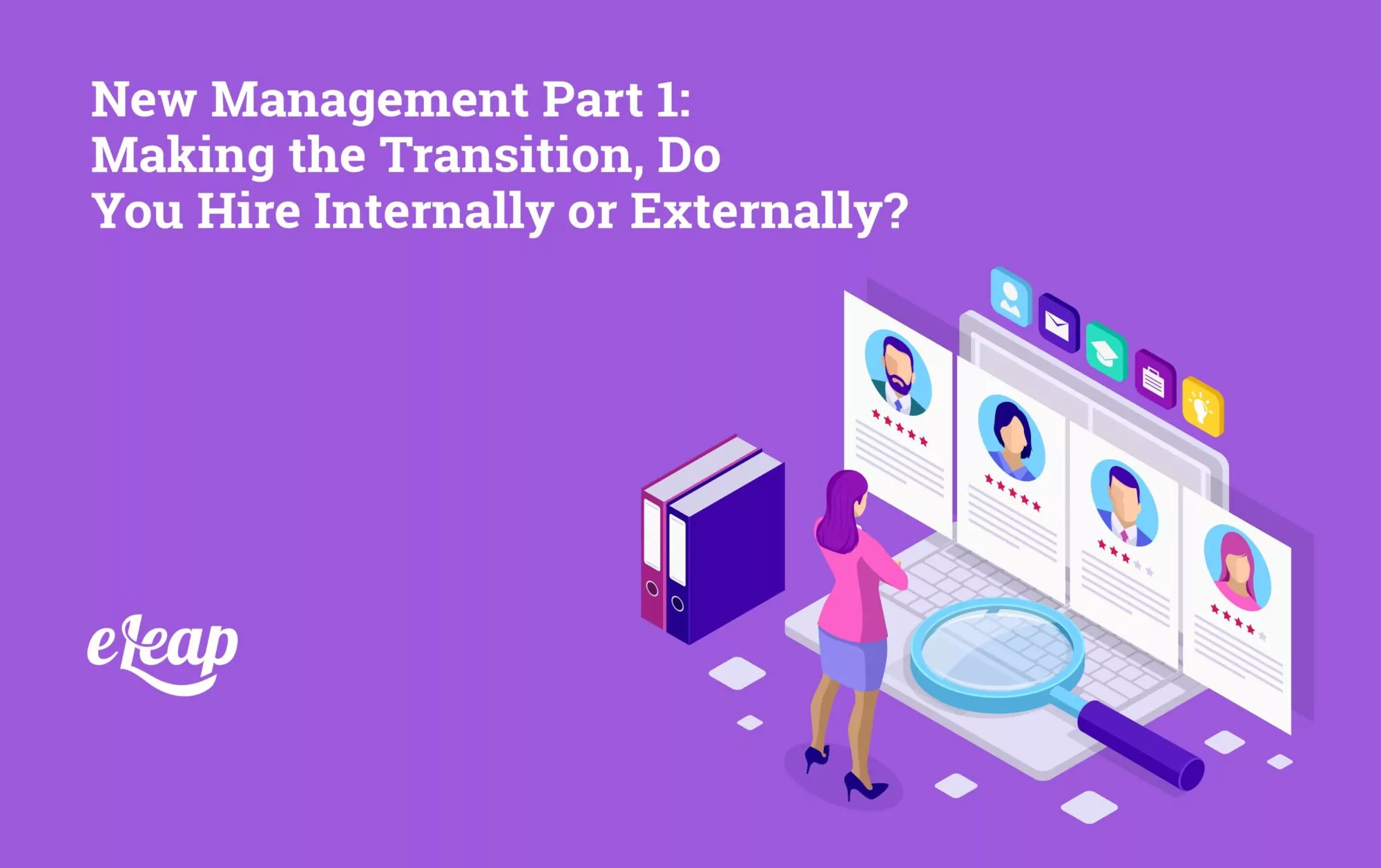New Management Part 1: Making the Transition, Do You Hire Internally or Externally?

New Management ! It’s amazing how many people want to be promoted into management positions but never actually make it past the first few months of their job. In some cases, this may be due to poor performance, while in others, it could simply come down to not having enough experience managing other people.
There are also those who have been passed over because they were too inexperienced when taking on a leadership role at work. Regardless of the situation, there’s no reason to be discouraged. Promoting from within could still be the best course of action – you just need the right process.
Alternatively, you can expand to a larger talent pool if you choose to find a manager from external sources. It’s a tough decision to make.
This article will discuss whether you should promote from within or consider external sources.

Choosing the Right Manager
There are plenty of reasons why someone would want to get promoted to a managerial position. Some may even think that being promoted implies more power than what really exists. That isn’t necessarily true, though.
The only real way to gain additional authority is by gaining knowledge about an organization and its goals and becoming respected within that group. A good leader has both skills – the talent to lead effectively and the efficiency in completing tasks successfully. It all depends on which type of person you choose to oversee your team members.
If there aren’t any internal candidates with the right mix of talents, perhaps the time has come to look externally for help. After all, if your company already knows of someone qualified to step up to the plate, then maybe it wouldn’t hurt to let them know that you need such a candidate.
However, before offering anyone else a chance for advancement, consider how your internal options fit the profile created by your hiring department.
The following tips should provide guidance in determining whether or not you should promote from within or outside the ranks.
Internal or External
This section helps you qualify individuals in your workforce already. Use the following questions to help determine if they’re management material.
Are They Qualified?
Even if one of the existing staff believes he/she deserves the next higher rank, does he/she possess the necessary education, training, and expertise to handle the added responsibilities that accompany a management position?
This question should include the specific duties required for each level. For example, if the individual in question comes from the sales department, and their primary managerial role includes dealing with clients directly and negotiating contracts, they’re probably well suited. On the other hand, if the job entails overseeing multiple administrative assistants, they may not have the necessary skill sets.
Does He/She Work Well With Others?
Many times employees who are known to clash personally or professionally will often impede productivity rather than encourage it. Before making the decision to hire an outsider, ask yourself if the new manager will bring along his/her own personal issues.
Will problems arise between him/herself and co-workers? Or are conflicts likely to occur amongst supervisors?
Keep in mind that the last thing you want is for your newly hired manager to take out their frustrations on subordinates. They must be able to keep a level head and view everything subjectively.
Will His/Her Skills Benefit Your Company?
When considering hiring an external professional, keep in mind that the person might lack the necessary credentials to perform the assigned tasks adequately. Be wary of individuals who seem overly eager to accept the position based solely on financial compensation.
Remember that money alone doesn’t guarantee success. Sometimes the most valuable asset a manager brings to the table is loyalty.
Promoting a Manager Internally
In order for an employee to advance beyond the status quo, s/he needs a strong support system in place. To accomplish this goal, several steps should be taken during the promotional process.
First, they should understand how to provide new hires with opportunities to develop their abilities and learn new skills. Second, managers should be held accountable for results.
Finally, former co-workers should feel comfortable coming forward with suggestions. By encouraging feedback and allowing input from co-workers, everyone involved becomes stronger together.
Here are five key points to remember when transitioning someone from worker to manager.
Develop Communication Skills
Communication skills go far in helping leaders build productive relationships. Whether communicating verbally or via email, they should be well-versed in dialogue. Once hired, managers should continue to hone their ability to communicate clearly with colleagues and superiors alike.
Set Expectations
Everyone wants to know exactly what’s going to happen next. From your boss to your subordinates, setting expectations helps everyone understand what’s wanted and desired.
Maintaining open lines of communication makes it easier for employees to explain themselves without feeling like they’re speaking to a wall. Set clear guidelines regarding rules and policies followed by holding everyone accountable to those standards.
Also, establish priorities and stick to them. Communicate progress made towards achieving objectives regularly. The right performance management system can help with all of these metrics for managers and employees alike.
Keep Confidentiality
Keeping information confidential protects privacy rights and prevents leaks of proprietary data. Managers should never share sensitive materials with employees unless asked specifically to do so. This could be difficult considering the people they’re now managing could still be considered friends.
Assuming your employee candidate fits all of these criteria, the best course of action is probably to hire internally. Deciding to promote from the inside has several benefits, including:
- Individuals are already well familiar with the processes involved in your organization.
- Regulatory compliance is already well-understood.
- Much better for corporate culture.
- The individual most likely has a good rapport with other employees.
Clearly, promoting from within has significant benefits. Additionally, you can use your current PMS platform to help your new manager track their goals and set new ones for everyone at the employee level.
The only challenge you may have is breaking the “friend” factor from employees in their old department. We’ll discuss how to handle this in our next article, which will help you complete the transitional process. The eLeaP continuous performance management system provides organizations with powerful options to attract and retain high caliber team members.